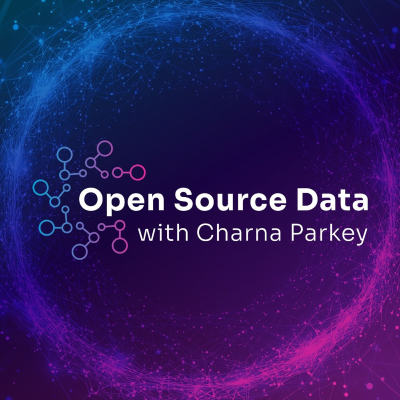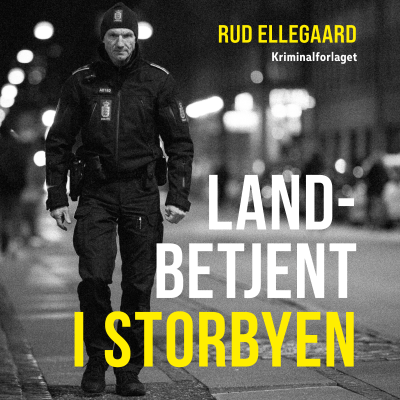
Open||Source||Data
engelsk
Videnskab & teknologi
Begrænset tilbud
2 måneder kun 19 kr.
Derefter 99 kr. / månedOpsig når som helst.
- 20 lydbogstimer pr. måned
- Podcasts kun på Podimo
- Gratis podcasts
Læs mere Open||Source||Data
What can we learn from ai-native development through stimulating conversations with developers, regulators, academics and people like you that drive forward development, seek to understand impact, and are working to mitigate risk in this new world? Join Charna Parkey and the community shaping the future of open source data, open source software, data in AI, and much more.
Alle episoder
103 episoderSeason 7 Finale: Open Source, AI in Real Life & Developments
Season 7 of Open Source Data marks the year of 2025 as a year of change. In the finale, host Charna Parkey and producer Leo Godoy take time to reflect on the conversations that defined the season, from the rise of “small AI” models to democratization, creativity in the workplace, bias in AI, and the human side of technological change. They discuss the shifting meaning of trust in media, the evolving ways professionals integrate AI into their careers, and the critical role of open source in keeping these conversations plural and transparent. QUOTES CHARNA PARKEY “If we really want to democratize, if we really want people to use these things, it has to be approachable and human readable." “Founders are founding that never would have before… because they can activate their domain expertise in a different kind of way with AI.” LEO GODOY “There’s so many things that sometimes you wouldn’t think that would need correction or a reroute, but there is, there always will be.” “Some concerns that we’ve had now in September are different from the ones that we’ve had in January.” TIMESTAMPS 00:00 — Season 7 Finale Kickoff 01:30 — Reflections on the Year 02:30 — Remembering the first ‘Open Source Data’ Livestream 04:00 — Small AI in 2025 06:00 — Democratization & Access 08:00 — Copyright, Fair Use & Trust 10:30 — Changing Media & Journalism 12:00 — The Kangaroo Clip & AI Realism 14:30 — Creativity & Workplace AI 16:30 — AI as a Career Roadmap 22:00 — Founders, New Roles & Opportunity 24:00 — Bias, Guardrails & Social Impact 26:30 — Open Source & Community Ownership 28:30 — What’s Coming in Season 8 32:00 — Multi-Agent Systems & Future Trends 34:00 — Thank You & Season Wrap-Up 36:00 — Closing Notes for Listeners
Can You Build AI Without Bias? | John Pasmore
John Pasmore, thinks the answer is yes — but not if we keep doing things the old way. In this episode, the CEO and founder of Latimer AI lays out the company’s strategy for inclusive AI: replace scraped social content with vetted academic material, digitize underrepresented history, and build guardrails with purpose. Charna and John also explore the implications for enterprise, healthcare, and education — sectors where small biases can cause serious harm. TIMESTAMPS [00:00:00] — Intro [00:02:00] — John's Journey into AI [00:04:00] — Data Sources & Historical Archives [00:06:00] — Underrepresented Digital Histories [00:08:00] — Flawed Training Sets in LLMs [00:10:00] — Measuring & Detecting Bias [00:12:00] — Algorithmic Bias in Hiring [00:14:00] — Copyright & Ethical Data Use [00:16:00] — Multimodal Platform Rollout [00:18:00] — Enterprise Privacy & LLM Hosting [00:20:00] — Optimism & Intergenerational Impact [00:22:00] — Founding in a Crowded Market [00:26:00] — Charna’s Takeaways on Systemic Bias [00:28:00] — Guardrails vs Structural Solutions [00:30:00] — Training Data vs Output Behavior [00:32:00] — Algorithmic vs Contextual Bias [00:34:00] — Providing Cultural Context to LLMs [00:36:00] — Community-Based Data Labeling [00:38:00] — The Yard Tour & HBCU Partnerships [00:40:00] — Wrapping up the Season & What’s Next QUOTES John Pasmore “If a company is using AI to look at resumes, what is it? How is it classifying people's names or, we're surprised that sometimes it's using the name and coming to some conclusion about the desirability of a candidate just based on their name, where maybe that wasn't the intent." Charna Parkey “Instead of modifying the model itself, we can say, okay, here's a historical context, here's a new cultural insight, and here's the situation. Now tell me about the outcome, right?"
How Open Data and AI Are Transforming Environmental Monitoring | Gracie Ermi
Machine learning scientist Gracie Ermi joins Charna Parkey to explore how AI and open-source satellite data are changing the way we understand land use, climate impact, and environmental risk. At Impact Observatory, she helps create high-resolution, publicly available maps used by educators, researchers, and global organizations alike. A conversation about the technical challenges behind these tools, what open access really looks like in practice, and the role AI plays in making environmental data faster and more useful. Quotes Charna Parkey “One of the most exciting things about where AI is headed is that we’re finally expanding its use beyond language. Gracie’s work is a prime example of how machine learning can interpret physical space, detect environmental change, and deliver insights that matter. It’s a reminder that AI isn't just a chatbot—it’s a tool to see, sense, and protect the planet.” Gracie Ermi “The biggest innovation we need right now isn’t necessarily a new AI model. It’s better, cheaper satellite imagery—especially higher-resolution data that’s still open access. Right now, we’re working mostly with Sentinel imagery, which has a 10-meter resolution. That’s great for a lot of things, but it limits what you can detect. Individual buildings, small changes—they get lost at that scale. If higher-res data became more affordable or openly available, it would change everything.” Timestamps 00:00:00 – Introduction to Gracie Ermi and Impact Observatory’s mission using AI and open data for environmental monitoring. 00:02:00 – Gracie shares how she discovered computer science and open source, and how that shaped her interest in using tech for impact. 00:04:00 – Why Gracie chose to work at a mission-driven organization that prioritizes open access and environmental good. 00:06:00 – Real-world uses of Impact Observatory’s open-source maps 00:08:00 – Challenges around tracking open-source usage and the tension between openness and attribution in the ecosystem. 00:10:00 – How AI speeds up the creation of land-use maps 00:12:00 – Discussion on classical computer vision versus GenAI in geospatial work 00:14:00 – The technical limitations of current satellite imagery, particularly resolution and frequency, and how they affect output. 00:16:00 – Ethical considerations of increasing image resolution and what it might mean for privacy and surveillance. 00:18:00 – Reflections on unexpected risks and consequences that come with technological advancement in mapping. 00:24:00 – Advice for people with nontraditional backgrounds who want to enter AI or conservation tech. 00:26:00 – How Gracie uses GenAI tools like ChatGPT to overcome creative friction and emotional resistance to complex tasks. 00:28:00 – How large language models might help make geospatial tools more accessible, and what’s next for the field.
Multi-Agent Systems and Human-Agent Collaboration | Rodrigo Nader
In this episode, Charna Parkey welcomes Rodrigo Nader, the founder of Langflow, an open-source, low-code app builder for multi-agent AI systems. Rodrigo and Charna dive into his beginnings in a small Brazilian town to the future of AI and the emergence of multi-agent systems. Discover how these systems will enable human-agent collaboration, increase productivity, and solve complex problems across various industries. --- TIMESTAMPS 00:01:00 Introduction to Rodrigo Nader, CEO and founder of Langflow, and an overview of Langflow's mission and recent developments. 00:03:00 - Rodrigo Nader's background and journey into open-source, data science, and machine learning, including his early experiences with MIT OpenCourseWare and Kaggle. 00:06:00 - Rodrigo's work at Bitvore Corp, focusing on structuring financial data using machine learning, and his introduction to the open-source AI ecosystem. 00:10:00 - The inspiration behind Langflow, including the idea of connecting multiple AI models to create a more powerful, trainable system. 00:15:00 - Discussion on the evolution of AI agents, their decision-making capabilities, and the future of multi-agent systems. 00:18:00 -The role of agents in AI development, the democratization of AI tools, and the potential for community-driven innovation. 00:22:00 -The importance of multi-agent collaboration and the future of human-AI interaction in productivity and task management. 00:26:00 - Common use cases for Langflow, including language model pipelines, RAG (Retrieval-Augmented Generation), and agentic systems. 00:30:00 - Challenges in AI development, particularly debugging and prompt engineering, and the need for better tools to visualize and monitor AI systems. 00:34:00 - Predictions for the future of AI in 2025, including the rise of specialized agents and the importance of human feedback in AI training. 00:38:00 - Rodrigo's personal interests outside of AI, particularly his fascination with physics, quantum mechanics, and the concept of time. 00:42:00 - Final thoughts on the democratization of AI tools, the importance of community contributions, and advice for aspiring developers and AI enthusiasts. 00:46:00 - Reflections with executive producer Leo Godoy, discussing the impact of Langflow, the differences between traditional and AI development, and the rapid pace of AI evolution. Quotes Charna Parkey "For any developer who has sort of avoided the soft skills, the managerial skills, et cetera, you should go listen to some of those courses. You are now going to be managing this AI workforce that you really do need to treat like a team of interns that you're delegating work to, that you're giving feedback on, and all of those skills of sort of like more senior-level engineering of design reviews, code reviews, feedback, like that's gonna be more central than actually writing a line of code yourself." Rodrigo Nader "We're going to see millions and millions more agents than humans very soon, right? So we don't think that these agents are going to emerge from, one, only developers, meaning like hard-code developers, neither from big companies creating solutions that will suddenly solve all the problems."
Why AI Can’t Scale Without Infrastructure Fixes | Darrick Horton
From energy bottlenecks to proprietary GPU ecosystems, the CEO of TensorWave, Darrick Horton explains why today’s AI scale is unsustainable—and how open-source hardware, smarter networking, and nuclear power could be the fix. QUOTES Darrick Horton “The energy crisis is getting worse every day. It’s very hard to find data center capacity—especially capacity that can scale. Five years ago, 10 or 20 megawatts was considered state-of-the-art. Now, 20 is nothing. The real hyperscale AI players are looking at 100 megawatts minimum, going into the gigawatt territory. That’s more than many cities combined just to power one cluster.” Charna Parkey “We’re still training models in a very brute-force way—throwing the biggest datasets possible at the problem and hoping something useful emerges. That’s not sustainable. At some point, we have to shift toward smarter, more intentional training methods. We can’t afford to be wasteful at this scale.” TIMESTAMPS [00:00:00] Introduction [00:01:00] Founding TensorWave [00:04:00] AMD as a Viable Alternative [00:08:00] Open Source as a Startup Enabler [00:09:30] Launching ScalarLM [00:12:00] ScalarLM Impact and Reception [00:14:30] Roadmap for 2025 [00:16:00] Technical Advantages of AMD [00:18:00] Emerging Open Source Infrastructure [00:20:00] Broader Societal Issues AI Must Address [00:22:00] AI’s Impact on Global Energy [00:26:00] Fundamental Hardware vs. Human Efficiency [00:30:00] Data Center Density Evolution [00:34:00] Advice to Founders and Tech Trends [00:38:00] AI Energy Challenges [00:44:00] AI’s Rapid Impact vs. Internet [00:46:00] Monopoly vs. Democratization in AI [00:50:00] Close to Season Wrap Discussion and Predictions
Vælg dit abonnement
Begrænset tilbud
Premium
20 timers lydbøger
Podcasts kun på Podimo
Gratis podcasts
Opsig når som helst
2 måneder kun 19 kr.
Derefter 99 kr. / måned
Premium Plus
100 timers lydbøger
Podcasts kun på Podimo
Gratis podcasts
Opsig når som helst
Prøv gratis i 7 dage
Derefter 129 kr. / måned
2 måneder kun 19 kr. Derefter 99 kr. / måned. Opsig når som helst.

































